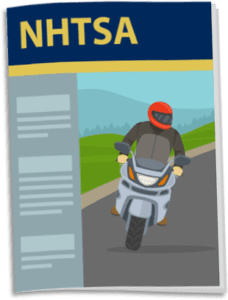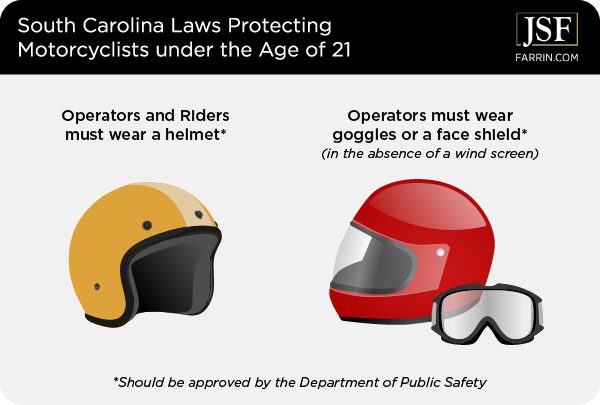Motorcycle riding is as popular as ever. In fact, during the pandemic, more people may have purchased motorcycles than in the past because they were prohibited from going in to work, restricted to their houses, and wanted to be outdoors. And naturally, fair weather, such as that found in South Carolina, tends to attract motorcyclists.
In 2021, there were 148,851 motorcycles registered in the state – that’s more than 2,800 motorcycle registrations per 100,000 people. This represents nearly a 40% increase of S.C. riders compared to a decade ago. With this many bikers out there on S.C. roads and highways, it’s important to understand the helmet laws regulating them.
What Are the Laws in South Carolina About Motorcycle Helmets?
People under the age of 21 are required to wear a helmet when riding or operating a motorcycle or moped (see Title 56 of the South Carolina Code of Law). The law also mandates that the helmet must be a protective helmet of a type approved by the Department of Public Safety (DPS), which requires either a neck or chin strap and reflective material on both sides.
Back in 1980, South Carolina repealed a stricter “universal helmet law” which required both riders and passengers, regardless of age, to wear helmets. South Carolina was not alone in its repeal, and less than 20 states still maintain universal helmet laws.
Laws Regarding Gear for the Rest of Motorcycle Riders’ Bodies
In addition to helmets, South Carolina law requires that operators under the age of 21 wear DPS-approved goggles or face shields, unless the motorcycle is equipped with a wind screen meeting DPS specifications. The law also prohibits individuals and companies from selling or distributing helmets, goggles, and face shields that do not meet DPS standards.
Penalties for Breaking South Carolina Helmet Laws
Someone under 21 who violates South Carolina’s motorcycle helmet law faces a misdemeanor offense. If convicted, the person could face a fine of up to $100 and be imprisoned for up to 30 days.
The same penalties apply for anyone selling or distributing substandard helmets, goggles, and face shields.
Is South Carolina Considering Any New Motorcycle Helmet Laws?

However, the government routinely tracks motorcycle crashes, fatalities, and helmet use. For example, the National Highway Traffic and Safety Administration (NHTSA) published a 2020 report stating that 67% of known motorcycle fatalities in South Carolina involved people not wearing helmets. Specifically, there were 45 deaths where the rider was wearing a helmet and 92 deaths (more than double) where the rider was not wearing a helmet.
The same report cited information stating that helmets are estimated to be 37% effective in preventing fatalities to motorcycle riders and 41% for motorcycle passengers. Stats like these sometimes inspire new laws.
Can Not Wearing a Motorcycle Helmet Impact Your Motorcycle Accident Injury Claim?
Yes, it can, but you still can seek compensation after a wreck caused by another’s negligence. South Carolina recognizes the doctrine of comparative negligence which means that for you (the plaintiff) to recover damages for a motorcycle accident in which you were injured, your negligence (fault) cannot be greater than that of the other party (the defendant). Stated simply, if you are found to be more than 50% at fault for your injuries, you could be denied compensation.
In the case of a motorcycle accident, failure to wear a helmet could possibly be considered negligent on your part and could be enough to prevent you from recovering compensation. This is one of the reasons I always urge motorcycle accident victims to seek the guidance of an experienced South Carolina motorcycle accident attorney before speaking to the other driver’s insurance company.
Comparative negligence can also affect the amount of damages you might recover because compensation can be reduced proportionally to the percentage you are found to be at fault. For example, if you were found to be 20% at fault, your recovery could be reduced proportionally, and you might only recover up to 80% of the damages you suffered. However, every case is unique and the slightest details can make a world of difference.
Learn More: Can you still seek compensation if injured while lane splitting?
If you have been injured in a motorcycle accident, you do not have to fight the insurance company for compensation for your harms and losses by yourself. The Law Offices of James Scott Farrin has helped many victims of motorcycle accidents in the Carolinas fight back. Check out what some of our Greenville, SC clients have to say about our firm here. We’d like to help you, too. Contact us for a free case evaluation, and tell us your story.
You May Also Be Interested In
Why Are More Bikers Dying? 4 Main Reasons. And 4 Things You Can Do.





